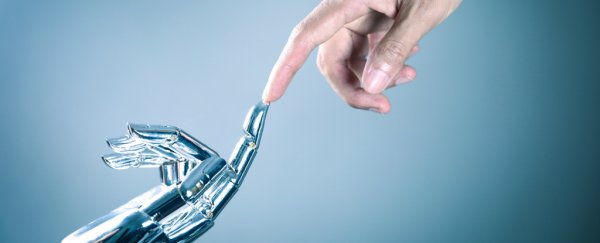The White House has finally broken its silence on the issue of artificial intelligence (AI), and the results are a mixed bag.
On Thursday, the Trump administration announced the start of a new AI technology committee that will uphold President Trump's 'America first' mentality in the tech sector.
The Select Committee on Artificial Intelligence was announced at a recent White House AI summit by Michael Kratsios, Trump's deputy chief technology officer and the de facto head of the Office of Science and Technology Policy (OSTP).
At the @WhiteHouse #AI Summit today, @WHOSTP DepAsst Michael Kratsios announced new Select Committee of federal leaders to coordinate research and rollout pic.twitter.com/WQH8gBvPCe
— Aaron Boyd (@Federal_IT) May 10, 2018
Tech figures received the news with enthusiasm.
"Today's White House meeting is critical to ensuring the potential of AI is achieved and advanced in a fashion that is broadly beneficial to Americans," said Dean Garfield, the President of Information Technology Industry Council, a lobbying group for major technology firms.
"The White House's new artificial intelligence advisory committee is a great first step to forge better collaboration between industry, government, and academia."
The announcement has surprised many given that up until this point, the Trump administration has remained oddly silent on the issue of AI, despite the important economic repercussions it will inevitably have.
In fact, just before this announcement was made, on the very same day, tech writer James Pethokoukis wrote a feature story in The Week titled, "Trump is MIA on AI."
Pethokoukis' timing is unfortunate, but it just goes to show how unexpected this decision was.
"Trumponomics has been all about economic nostalgia and trying to reanimate the US industrial economy of the 1950s and 1960s," wrote Pethokoukis.
"A Trump speech on "economic revival" last October turned into a paean to the American trucker and how they would benefit from tax cuts — but not a word on how autonomous driving tech will make many of those jobs obsolete."
Trump's Treasury secretary, Steven Mnuchin, has said that the problem of automation taking over people's jobs was "not even on [his] radar screen."
Even after China unveiled a plan to become the world leader in AI last year, the White House did not respond to the direct challenge.
Some also noticed that the Chinese plan, which promised to add a $150 billion industry to its economy by 2030, looked strangely similar to an Obama-era AI plan released in 2016.
"It is remarkable to see how AI has emerged as a top priority for the Chinese leadership and how quickly things have been set into motion," Elsa Kania, an adjunct fellow at the Center for a New American Security, told The New York Times.
"The US plans and policies released in 2016 were seemingly the impetus for the formulation of China's national AI strategy."
The lack of response from the Trump administration to China's head start in AI was beginning to worry the tech industry.
"The U.S. cannot afford to waste an entire presidential term, much less two, with little to no leadership on AI from the Oval Office occupant," wrote Pethokoukis.
"Hopefully corporate America, and especially Silicon Valley, will make this clear today."
Pethokoukis got his wish shortly after. Acknowledging how AI technology will change the future economy, Kratsios promised that job losses were a priority issue for the administration.
"To a certain degree job displacement is inevitable," Kratsios said.
"But we can't sit idle, hoping eventually the market will sort it out. We must do what Americans have always done: adapt."
He argued that sitting idly by would inevitably result in the US falling behind - certainly not the 'America first' mentality that Trump supporters voted for.
"Erecting barriers to innovation does not stop the future. It makes the future move overseas," said Kratsios.
Speaking on the same day to 40 leading companies - including Google, Facebook, Goldman Sachs and Boeing - Kratsios assured the businesses that there would be no government barriers when it comes to AI.
"We didn't cut the lines before Alexander Graham Bell made the first telephone call," Kratsios said in his prepared remarks.
"We didn't regulate flight before the Wright Brothers took off at Kitty Hawk."
No such concessions were made for any other technology, including renewable energy.
The comments are worrying for two reasons. The first being that zero regulation or barriers for companies with new technology has already been proved dangerous - just look at Facebook's recent breach of private information.
The second is that Kratsios, who is a 31-year-old with a political science degree, is highly under-qualified to be advising such a decision, and the Trump administration is still lacking a chief science advisor.
In fact, Kratsios is the de facto head of the OSTP because Trump has still not nominated someone to lead the scientific branch of the Executive Office.
Meanwhile, leading figures in the tech industry, like Elon Musk, have been arguing for years that AI regulation and legislation is an absolute necessity for the future of humanity.
"I have exposure to the very cutting edge AI, and I think people should be really concerned about it," Musk said last year.
"AI is a rare case where we need to be proactive about regulation instead of reactive," he added.
"Because I think by the time we are reactive in AI regulation, it's too late."
It's exciting that the Trump administration is finally acknowledging the importance of AI, but if Musk is right, we should also be acknowledging its dangers.
Science AF is ScienceAlert's new editorial section where we explore society's most complex problems using science, sanity and humor.
